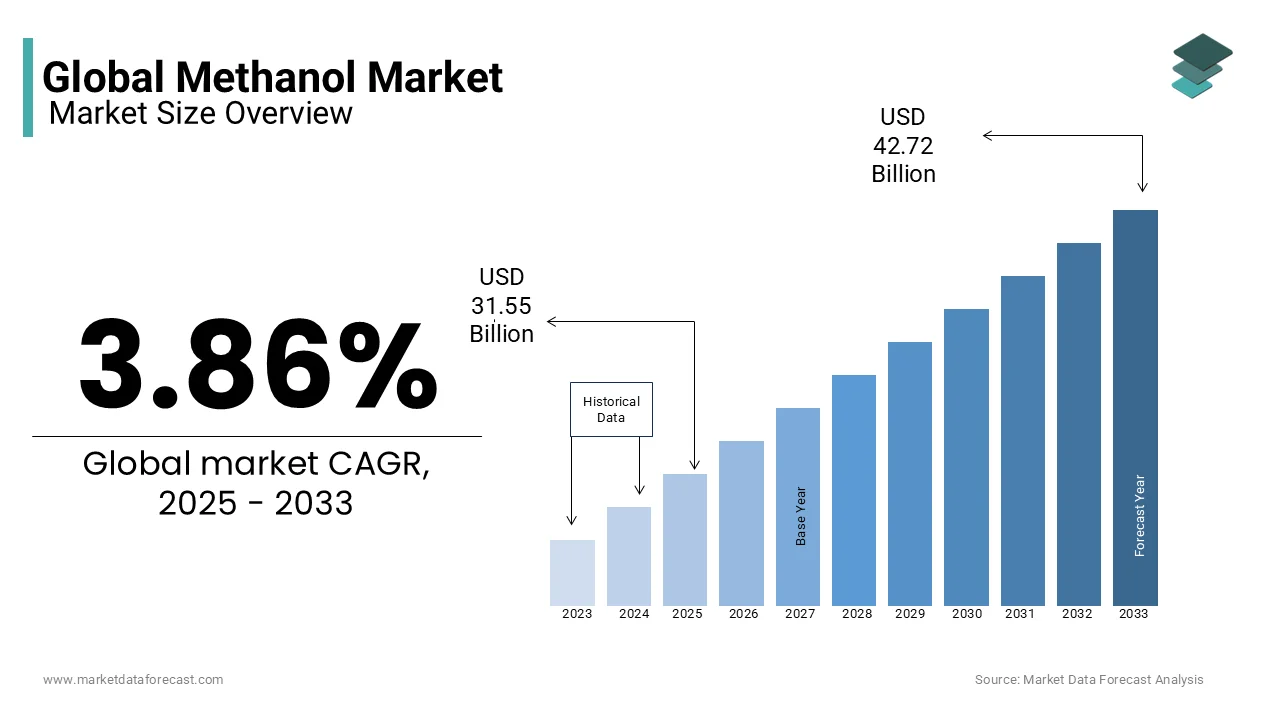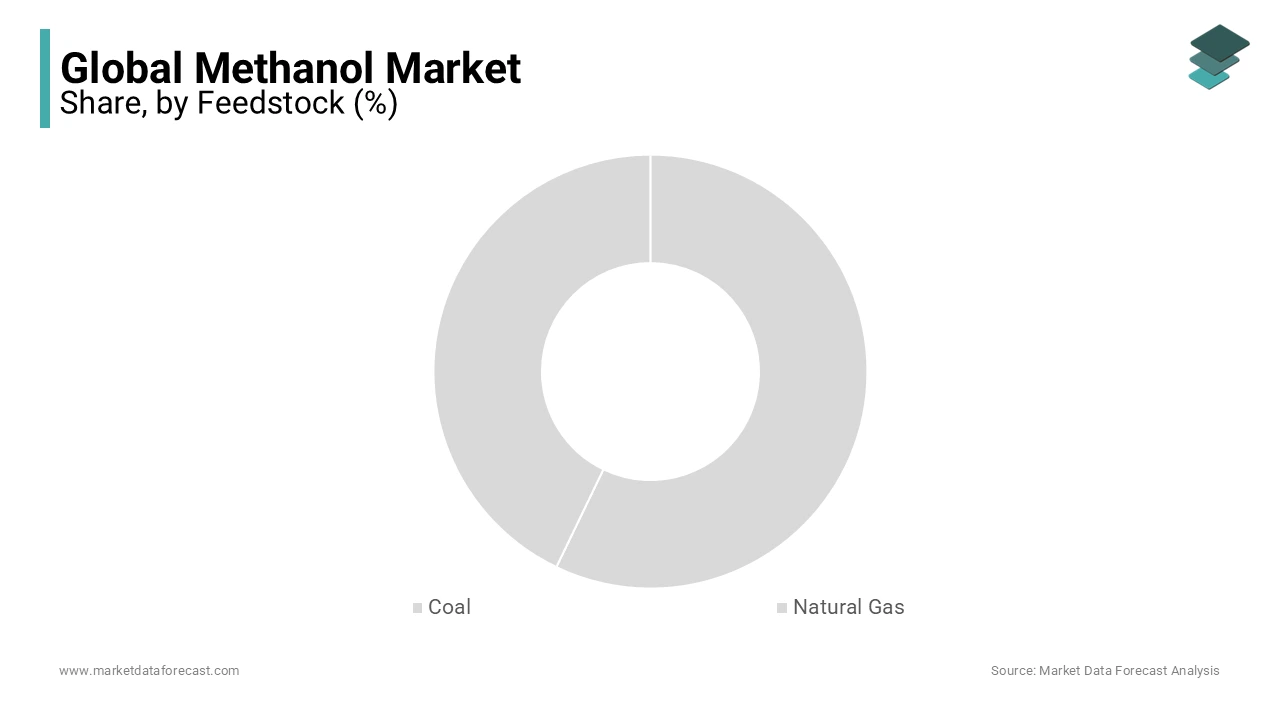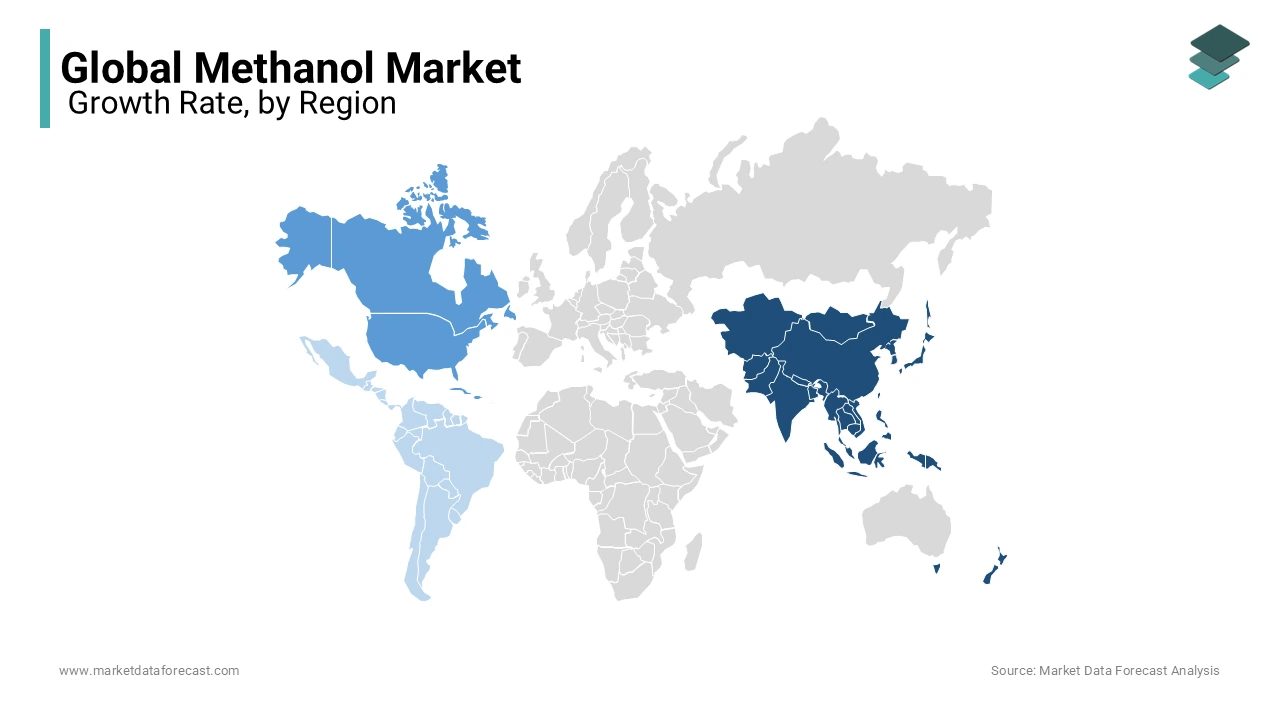Global Methanol Market Research Report - Segmentation By Feedstock (Coal, Natural Gas, Others), Application (Formaldehyde, MTO/MTP, MTBE, Solvent, Biodiesel, Acetic acid, MMA, DME, Others ), End-User (Automotive, Insulation, Construction, Electronics, Paints & Coatings, Appliances, Packaging, Pharmaceutical, Others), Region (North America, Europe, Asia Pacific, Latin America, Middle East - Africa) – Industry Forecast period 2024 to 2032.
Global Methanol Market Size (2024 to 2032)
The Global Methanol Market was worth US$ 30.38 billion in 2024 and is anticipated to reach a valuation of US$ 40.94 billion by 2032. It is predicted to register a CAGR of 3.8% during the forecast period from 2024 to 2032.

Current Scenario of the Global Methanol Market
Methanol is the simplest alcohol which acts as a major building block for most everyday products, including plastics, paints, car parts, and construction materials. Methanol is also known as the clean energy resource that is used for fuel cars, trucks, buses, ships, fuel cells, boilers, and others. Methanol is used for vehicles and boats and blended into gasoline for the efficient fuel, methyl tertiary butyl ether (MTBE). This fuel is estimated to lower the emissions compared to the conventional gasoline. Methanol can be used as biodiesel, renewable fuel made from plants, or animal fat that replaces or blends with conventional fuel. The global methanol market has witnessed prominent growth in the past years. It is anticipated that notable growth will be registered with a significant growth rate during the forecast period—the various applications of Methanol will control the expansion of the market revenue. Around 45% of the world’s Methanol is utilised in the energy-related applications, escalating market growth opportunities.
MARKET DRIVERS
The methanol market is rising due to its clean and renewable energy source. It can be transformed into bio-methanol, an eco-friendly fuel that reduces greenhouse gas emissions compared to traditional fossil fuels.
With the world's focus on cleaner, sustainable energy solutions, the market growth for Methanol as a green energy option is on the rise. Therefore, the surge in interest in Methanol's environmental potential is a major driver of the market. It aligns with the ongoing shift toward greener and more responsible energy sources, making Methanol a crucial player in the clean energy sector.
The methanol market is driven due to its pivotal role in the chemical industry. It's an important ingredient in producing various chemicals and materials, such as plastics and adhesives. Methanol is the foundation for creating essential chemicals like formaldehyde, acetic acid, and olefins. The consistent demand for these products keeps Methanol in high regard, driving the market's growth. Its versatility and importance in chemical processes make it indispensable for diverse industrial applications, solidifying its position as a reliable cornerstone in the chemical manufacturing landscape. As a result, Methanol's versatility as a cleaner fuel contributes to its market expansion.
The methanol market is experiencing growth driven by its role as an alternative transportation fuel. It is used both in methanol-powered vehicles and as an additive in conventional fuels to reduce harmful emissions. As the market demand for cleaner and more environmentally friendly transportation fuels continues to surge, Methanol's prominence in this sector is steadily rising. The increasing emphasis on eco-friendly mobility solutions aligns with the global shift towards reducing pollution and promoting sustainable transportation. Methanol's versatility as a cleaner fuel not only contributes to reduced emissions but also supports its expansion in the market, marking a significant step towards greener and more sustainable transportation solutions.
MARKET RESTRAINTS
The high toxicity of Methanol is a primary factor restraining market growth as contact with the Methanol produces harmful effects such as irritation in the eyes, skin, and mucus membranes. Exposure to Methanol in industries may lead to significant health issues and death in untreated cases; this is limiting the adoption in various industries. Various factors, such as lower efficiency, the requirement of high-purity Methanol for Methanol fuel cells, and the cases of membrane damage owing to its storage at sub-zero temperatures, hamper the global market growth. Methanol causes congenital disabilities in humans owing to its exposure as it majorly impacts the central nervous system. The production of Methanol from natural gas enhances carbon dioxide emissions, which leads to global warming; this is expected to impede market growth opportunities; the growing environmental concerns among the people and the increasing adoption of sustainable practices among the industrial players are expected to influence negatively on the global market expansion. The high costs of the methanol refineries are restricting market expansion due to the limited budgets of most low- and middle-income organizations. The requirement of flex-fuel vehicles for gasoline operation due to the Methanol’s potential and the high formaldehyde emissions are hindering the methanol market growth rate.
MARKET OPPORTUNITIES
The growing applications of Methanol in transportation and increased utilization of Methanol as marine fuel, free of sulfur, are expected to augment the market growth opportunities during the forecast period. The rising replacement of LPG, Kerosene, and wood charcoal with Methanol in Methanol is estimated to provide market growth opportunities during the forecast period. The methanol fuel cells generate electricity, which can be used as portable energy sources. The escalating demand for Methanol worldwide will boost the market revenue in the coming years. The cheaper cost of Methanol is the primary factor enhancing its adoption compared to alternative fuels, which propels the market growth.
MARKET CHALLENGES
Methanol is highly flammable and can be ignited through sparks and heat, requiring high prevention measures, and the chances of explosions are high in the industries. This is a major challenge for the manufacturers due to high precautional measures limiting the market revenue expansion. Various challenges regarding the storage and handling of the Methanol due to methanol density and lower heating value, where the methanol tanks are about 2.5 times larger than the oil tanks. The presence of stringent regulations regarding the safety, storage, and utilization of Methanol in various industrial applications will be challenging for manufacturers in expanding the market revenue as it comprises complexity, more extended consumption of time, and increased investments.
REPORT COVERAGE
|
REPORT METRIC |
DETAILS |
|
Market Size Available |
2023 to 2032 |
|
Base Year |
2023 |
|
Forecast Period |
2024 to 2032 |
|
CAGR |
3.8% |
|
Segments Covered |
By Feedstock, Application, End-user Type, Region. |
|
Various Analyses Covered |
Global, Regional, and Country Level Analysis, Segment-Level Analysis, DROC, PESTLE Analysis, Porter’s Five Forces Analysis, Competitive Landscape, Analyst Overview of Investment Opportunities |
|
Regions Covered |
North America, Europe, Asia Pacific, Latin America, Middle East & Africa |
|
Market Leaders Profiled |
Methanex Corporation, SABIC (Saudi Basic Industries Corporation), Celanese Corporation, Mitsubishi Gas Chemical Company, Inc., INEOS Group, YCI Methanol One, LLC, Atlantic Methanol Production Company LLC (AMPCO), Mitsui & Co., Ltd., Zagros Petrochemical Company (ZPC), LyondellBasell, and Others. |
SEGMENTAL ANALYSIS
Global Methanol Market Analysis By Feedstock

Based on Feedstock, the Natural gas-based methanol segment is dominating the market and is expected to generate a revenue of 23.5 billion by the end of this forecast period.
Due to its abundance, cost-effectiveness, and environmental benefits. This process typically involves steam methane reforming (SMR), where methane from natural gas reacts with steam to yield hydrogen and carbon monoxide, subsequently transformed into Methanol via catalytic conversion. The dominance of this feedstock type is attributed to the widespread presence of natural gas reserves in numerous regions, ensuring a dependable and economical source for methanol production.
The coal-based methanol segment holds the largest market share, at 45%, and is expected to generate revenue of 13.5 billion during the forecast period. This process involves coal gasification to create synthetic gas (syngas), which is rich in carbon monoxide and hydrogen. Syngas serves as the primary Feedstock for methanol synthesis. While competitive in regions abundant with coal resources, coal-based Methanol poses environmental concerns due to greenhouse gas emissions and pollutant release during gasification. Nevertheless, it remains a substantial feedstock source for Methanol, particularly in areas where coal is both accessible and cost-effective.
Global Methanol Market Analysis By Application
Based on application, the Formaldehyde segment holds the largest market share, at 30%, during the forecast period due to its use in the production of diverse products, including adhesives, resins, and textiles.
It serves as a critical precursor for manufacturing a wide array of goods, establishing itself as one of the prominent segments in the methanol market. The demand for formaldehyde remains steadfast, particularly in the construction and automotive industries, where it finds extensive use in various applications.
MTO (Methanol-to-Olefins) and MTP (Methanol-to-Propylene) segments hold the second biggest market share of 22% during the forecast period due to their innovative applications of Methanol, serving as efficient and cost-effective methods for producing essential chemicals in the petrochemical industry. These processes have garnered increasing attention in recent years, aligning with the industry's transition to Methanol as a valuable feedstock. The MTO/MTP segment demonstrates steady growth, highlighting the significance of Methanol in supplying key building blocks for the petrochemical sector.
Global Methanol Market By End-User Type
Based on End-User, The Automotive industry segment holds the largest market share and is expected to generate a revenue of 10.2 billion during the forecast period.
It is used to enhance fuel combustion efficiency and reduce emissions, contributing to improved environmental performance. Although the extent of its application may differ across regions, the automotive sector maintains a consistent demand for Methanol to optimize fuel efficiency and align with stringent environmental regulations.
The construction industry segment holds the second largest share, at 20%, during the forecast period. It is employed in adhesives, sealants, and concrete additives, enhancing the strength and durability of construction projects. Methanol's contributions to these construction components and processes help ensure the longevity and structural integrity of buildings and infrastructure, making it a valuable ingredient in the construction sector.
REGIONAL ANALYSIS

The Asia Pacific region is dominating the market growth with a CAGR of 4.8% and is expected to generate a revenue of 20 billion in 2021 due to its thriving automotive and construction sectors.
The region's insatiable appetite for Methanol stems from the swift industrialization and urban expansion experienced across various nations, such as China and India. As these countries continue to experience rapid economic growth, the demand for Methanol remains robust, making Asia-Pacific the largest and most significant market for this versatile chemical compound.
North America Methanol Market holds the second largest market share, 21%, during the forecast period.
Primarily propelled by the automotive industry. Methanol's utilization as a fuel additive to improve combustion efficiency and lower emissions has gained significant attention. Stringent environmental regulations have accelerated the demand for cleaner-burning fuels, making Methanol a key player in this region. As the pursuit of greener alternatives continues, the North American methanol market remains strong, aligning with eco-friendly automotive trends.
Europe Methanol Market holds a significant market share of 12% during the forecast period due to its established construction and automotive sectors.
Methanol plays a vital role in construction materials and automotive applications, aligning with the region's emphasis on energy efficiency and sustainability. Furthermore, the pharmaceutical and electronics industries contribute to the consistent demand for Methanol in Europe. This well-rounded market highlights the versatility and significance of Methanol across various sectors, making it a cornerstone of the regional chemical industry.
The Middle East and Africa Methanol Market is predicted to witness notable growth during the forecast period.
It is a major producer of Methanol, and its consumption is driven by both domestic and export markets. Methanol serves as a feedstock for the region's expanding chemical industry.
Latin America has a growing demand for Methanol, particularly in the energy sector and for MTBE production. The market is influenced by economic growth and regional fuel standards.
KEY PLAYERS MARKET
Companies playing a promising role in the global methanol market include Methanex Corporation, SABIC (Saudi Basic Industries Corporation), Celanese Corporation, Mitsubishi Gas Chemical Company, Inc., INEOS Group, YCI Methanol One, LLC, Atlantic Methanol Production Company LLC (AMPCO), Mitsui & Co., Ltd., Zagros Petrochemical Company (ZPC), LyondellBasell, and Others.
RECENT HAPPENINGS IN THE MARKET
- In January 2024, Celanese Corporation announced the start of carbon capture and utilization at the Fairway Methanol Company plant. This plant is expected to produce around 130,000 metric tons of Methanol from ethanol and metric tons of greenhouse gas carbon dioxide yearly.
- In January 2024, BASF SE announced its partnership with Envision Energy, which is a leading provider of net-zero solutions in green technology. This is expected to improve the conversion of green hydrogen and carbon dioxide into e-methanol through the advanced and dynamic process design. The BASF provides Synspire catalyst technology, where Envision Energy will integrate an innovative management system for the conversion of green hydrogen and carbon dioxide to e-methanol.
- In July 2023, Enerkem and Dimeta announced their joint venture, which initiated feasible studies in the development of two large-scale projects that would convert waste into renewable and recycled carbon dimethyl ether (DME).
DETAILED SEGMENTATION OF THE GLOBAL METHANOL MARKET IS INCLUDED IN THIS REPORT
This research report on the global methanol market has been segmented and sub-segmented based on feedstock, application, end-user type, and region.
By Feedstock
- Coal
- Natural Gas
- Others
By Application
- Formaldehyde
- MTO/MTP
- MTBE
- Solvent
- Biodiesel
- Acetic acid
- MMA
- DME
- Others
By End-User Type
- Automotive
- Insulation
- Construction
- Electronics
- Paints & Coatings
- Appliances
- Packaging
- Pharmaceutical
- Others
By Region
- North America
- Europe
- Asia Pacific
- Latin America
- Middle East & Africa
Frequently Asked Questions
1. What is the CAGR of the Methanol Market from 2024-2029?
The Methanol Market is expected to grow with a CAGR of 3.8% during the forecast period.
2. Which is the dominating region for the Methanol Market share?
Asia-Pacific is currently dominating the Methanol Market share by region.
3. Which End-User type is dominating the market for the Methanol Market?
The "Automotive" segment dominates the Methanol Market by End-User type.
Related Reports
Access the study in MULTIPLE FORMATS
Purchase options starting from $ 2500
Didn’t find what you’re looking for?
TALK TO OUR ANALYST TEAM
Need something within your budget?
NO WORRIES! WE GOT YOU COVERED!
Call us on: +1 888 702 9696 (U.S Toll Free)
Write to us: [email protected]